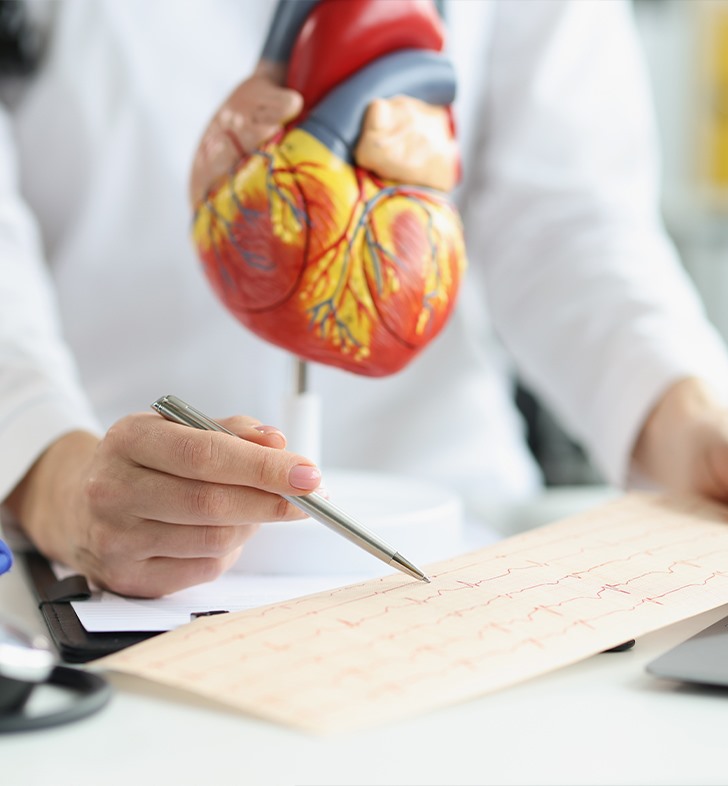
Abdominal Aortic Aneurysm
Your aorta is the large artery at the end of your heart’s aortic valve. It carries oxygen-rich blood away from your heart to the rest of your body. It travels through your chest, where it’s called the thoracic aorta, and into your abdomen, where it’s called the abdominal aorta. From there, it splits into separate arteries that take blood to your legs and feet.
White men over 65 are the most likely to get AAA. Additional risk factors include: Smoking (90% of people with AAA have a history of smoking, so you’re still at risk even if you’ve quit). Being a woman over 70. Personal history of an aneurysm in another site, especially in your lower extremities. Family history of AAA (if a parent or sibling has had an AAA, you’re twice as likely to develop the condition). High blood pressure. High cholesterol. Obesity.
How common are abdominal aortic aneurysms? AAA is a common condition. Healthcare providers diagnose about 200,000 people in the U.S. with the condition each year. It’s the 10th leading cause of death in men over 55.
What causes an abdominal aortic aneurysm?
The following diseases can damage your blood vessel walls or
cause weak spots where aneurysms might develop:
- Atherosclerosis (plaque buildup inside your arteries).
- Cardiovascular disease.
- Peripheral artery disease (PAD).
- Traumatic injuries that cause tears in the artery wall.
- Tobacco use causes loss of structural proteins in the artery
wall, leading to reduced wall strength.
- Vasculitis (blood vessel inflammation).
Research suggests AAA may also relate to genes you inherit
from your parents. Some genetic diseases that affect connective tissues, such
as Marfan syndrome or Ehlers Danlos type IV, can also cause blood vessel
weakness or damage. These conditions more commonly affect the aorta in the
chest but also the abdominal aorta.
What are the symptoms of an abdominal aortic aneurysm?
Most people with AAA don’t have any symptoms until the
aneurysm is close to rupturing. You may experience:
- Back, leg or abdominal pain that doesn’t go away.
- Pulsing sensation in your belly, like a heartbeat.
Signs of a ruptured AAA, which is a medical emergency, can
include:
- Clammy, sweaty skin.
- Dizziness.
- Fainting.
- Fast heartbeat.
- Nausea and vomiting.
- Shortness of breath.
- Sudden, severe pain in your belly, lower back or legs.
How are they diagnosed?
Since AAAs don’t usually cause symptoms, healthcare
providers often diagnose unruptured AAAs when they’re performing exams or tests
for other health conditions. The following imaging exams may reveal an AAA:
Abdominal ultrasound: An ultrasound is a quick, painless test
that uses sound waves to create real-time images of the inside of your belly.
Your healthcare provider may be able to see an aneurysm on an abdominal
ultrasound.
Computed tomography angiography (CTA): Your healthcare
provider may do a CTA if they see an aneurysm on your ultrasound. You receive
an injection of a contrast dye before a CT scan. Angiography helps your
provider see the exact location, size and severity of the aneurysm.
How are abdominal aortic aneurysms treated?
Treatment depends on the size of the aneurysm. Aneurysms
that are less than five centimeters in diameter have a low risk of rupturing
and may not need treatment right away. Your healthcare provider may recommend
“watchful waiting,” which includes:
Getting ultrasounds every few months to make sure the
aneurysm isn’t getting bigger.
Making lifestyle adjustments, such as exercising, not
smoking, eating a healthy diet, avoiding alcohol and maintaining a healthy
weight.
Taking medication to lower your blood pressure.
No known medication, supplement or other treatment can
shrink an aneurysm once it has formed. The goal of the measures above is to
keep your aneurysm from growing and identify which people have a high risk of
rupture, meaning they would benefit from surgery to treat their AAA.
Surgery for abdominal aortic aneurysm
Aneurysms that are larger than five centimeters across or
that show signs of rupturing need surgery. Depending on the size, location and
complexity of your aneurysm, your healthcare provider may recommend:
Open surgery: A surgeon makes an incision in your belly to
gain access to your abdominal aorta. They sew a graft (tube made of a strong,
synthetic material) onto the bulging section of the aorta. The graft reinforces
the aneurysm to prevent a rupture. After open surgery, you stay in the hospital
between four and 10 days. It can take several months to recover.
Endovascular aneurysm repair (EVAR): EVAR is a minimally
invasive aneurysm repair surgery. A surgeon makes a small incision in your
groin and inserts a catheter (thin, flexible tube) into an artery. With X-ray
guidance, they thread the catheter up to the location of the aneurysm. The
catheter contains an expandable stent that opens up inside your aorta to
reinforce the aneurysm and prevent a rupture. After EVAR, you stay in the
hospital for about three days. Recovery is shorter than that of open surgery.
After either type of aneurysm repair, it’s critical that you
continue to follow up with your provider for surveillance of your repaired
aorta. This again can be done with ultrasound or CT.
What are the risks of surgery?
Minimally invasive surgery has a lower chance of
complications than open surgery, but risks still include:
- Bleeding.
- Infection.
- Pain.
- Reaction to anesthesia.